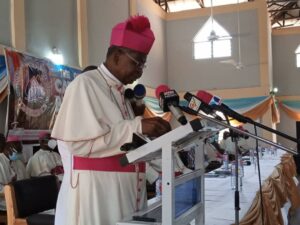Promise to protect public purse now illusion – Bishop Naameh
 Most Rev. Philip Naameh, Metropolitan Archbishop of Tamale and President of Ghana Bishops’ Conference, has stated that perceived corruption and corruptible practices by politicians and other politically exposed persons in Ghana are taking a toll on the national economy.
Most Rev. Philip Naameh, Metropolitan Archbishop of Tamale and President of Ghana Bishops’ Conference, has stated that perceived corruption and corruptible practices by politicians and other politically exposed persons in Ghana are taking a toll on the national economy.
He said corruption was also making the poverty situation to grow progressively, emphasizing that “Poverty is grinding down millions of people all over the country”.
Most Rev. Naameh who stated this during the opening of the Ghana Catholic Bishops’ Conference (GCBC) in Wa, noted that prices of essentials were rising daily as family people struggled to keep families and lives together.
“Though poverty stirs us in the face, it appears lost to those with power. The expressed commitment of the President of the Republic to protect the public purse, a promise that citizens welcomed, seems to be an illusion now”, the Metropolitan Archbishop pointed out.
“Are those managing the public purse not concerned about waste and misapplication of resources that belonged to all Ghanaians”, he questioned and urged those who wield power to exercise it responsibly and with empathy and compassion.
The Most Rev. Naameh noted that power could be used to destroy or build, to heal or to bind a people together and could also be used for self-glorification and gratification or selfless public service.
He noted that power did well to the general society when used with compassion, empathy, truthfulness, humility, care and justice, but when used for self-glorification and self-gratification, it would ultimately disintegrate the moral fabric of any society and breed violence and chaos.
The Archbishop of Tamale explained that his remarks were meant to draw the attention of all to their individual and collective responsibilities for managing the power they hold.
“Those who are entrusted with power that comes from our collective will must know that what they do with that power shapes what we all will become in the future”, he said and added that they must therefore handle it with compassion, empathy, truthfulness, humility and service for all without discrimination.
Touching on the conference theme: “Fratelli Tutti and COVID-19: Pastoral Opportunities and Challenges in Ghana”, the Most Rev. Naameh noted that besides recovering kindness, Fratelli Tutti challenged them to build lasting peace in society by upholding the truth, fostering both ‘architecture’ and art of peace, making love the foundation of their forgiveness, abolishing capital punishment, and forever saying “No” to wars.
Dr Hafiz Bin Salih, the Upper West Regional Minister, noted that government had over the years followed with keen interest the activities of the GCBC and admitted that the contribution of the Conference in shaping national discourse was phenomenal.
He said the communiqué issued on topical national issues at the end of deliberations at the Conference was of paramount concern to government and there was no doubt it helped government to address some of the issues.
“I want to encourage you to register your views on national issues that bother on development as they have the potential in helping government to take an informed decision on them.”, the Minister said.
Most Rev. Richard Kuuia Baawobr, the Bishop of Wa, noted that the Catholic Church in the region had promoted indigenization and enculturation and was ever mindful of the call to work towards being a self-reliant and self-sustaining Church.
He said the Church had established basic Christian communities, skills training and access to affordable rural social services, amenities and infrastructure like schools, clinics and hospitals.
This, according to the Bishop, had contributed to the reduction of vulnerability and exclusion in needy communities through special education of the disabled and orphans as well as support of widows and the marginalized.
Most Rev. Henryk Mieczyslaw Jagodzinski, the Apostolic Nuncio to Ghana called on all to work together to promote peace and justice for all especially the vulnerable in society.
Source: GNA
